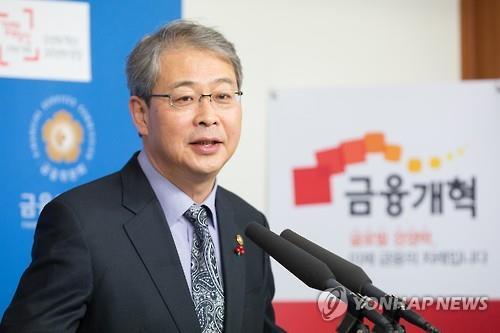Korea will cut red tape related to “robo advisers,” allowing intelligent machines to advise retail investors where to put their money from later this year, the nation’s top financial regulator said Thursday.
In addition, a new class of human advisors who work independently for clients and do not represent any bank, securities or insurance firm, will be allowed to debut, the Financial Services Commission said.
 |
Financial Services Commission chairman Yim Jong-yong (Yonhap) |
“The plans are intended at advancing Korea’s financial advisory industry and enhancing wealth enhancement opportunities for financial consumers living in this era of low interest rates and a longer life after retirement,” Kim Tae-hyun, a FSC director, told reporters in Seoul.
Currently, “robo advisers,” which refer to services that provide automated, algorithm-based portfolio management tips, are available in Korea only in a hybrid form that involves humans – professional investment advisers – as a conduit between the new investment tool and clients.
The FSC will push to revise related laws to allow the launch of entirely automated services. It expects to see beta services starting from July.
Robo advice, with its low-cost service and mass-market use, is a hot new trend in the financial advisory world. It is projected to grow into a market of $450 billion by 2020 from $20 billion at the end of June 2015.
Korean authorities see it as having the potential to augment investment services for the underserved population of financial customers who do not meet traditional standards for private banking services.
According to the FSC, four Korean commercial banks and 10 securities companies have started, or have plans to offer robo advice this year.
The envisioned independent financial advisers will be prohibited from earning commissions from financial companies with respect to their product recommendations or sales. Instead, they can charge clients for their investment tips, the FSC said.
To open the door to the new group of advisers, the regulator plans to ease the minimum capital requirements for financial advisory service providers to 100 million won ($85,709) from the current 500 million won.
By Lee Sun-young (
milaya@heraldcorp.com)




![[Herald Interview] 'Trump will use tariffs as first line of defense for American manufacturing'](http://res.heraldm.com/phpwas/restmb_idxmake.php?idx=644&simg=/content/image/2024/11/26/20241126050017_0.jpg)


![[Health and care] Getting cancer young: Why cancer isn’t just an older person’s battle](http://res.heraldm.com/phpwas/restmb_idxmake.php?idx=644&simg=/content/image/2024/11/26/20241126050043_0.jpg)
